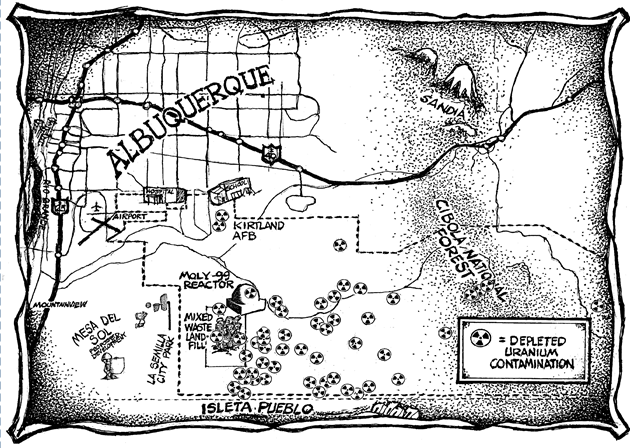
Nuclear Watch of New Mexico
Files
Download Full Text (419 KB)
Document Type
Report
Date
11-2003
Description
In August 2001 Nuclear Watch of New Mexico (NWNM) was funded by the Citizens’ Monitoring and Technical Assessment (MTA) Fund to conduct an “Assessment of the Environmental and Economic Impacts of Department of Energy Environmental Management Programs in New Mexico.”
New Mexico is home to two of the three nuclear weapons laboratories in the United States, Los Alamos and Sandia National Laboratories. New Mexico also hosts the Waste Isolation Pilot Plant, the world’s only deep geological disposal site for radioactive transuranic wastes (which are primarily plutonium contaminated wastes resulting from bomb research and production). These three sites were the focus of NWNM’s project.
In May 2002, the New Mexico Environment Department (NMED) issued under its Resource and Recovery Act (RCRA) authority a draft “Corrective Action Order” against Los Alamos National Laboratory (LANL). This Order mandates the investigation and compilation by the lab of comprehensive environmental information categorized by different lab Technical Areas, watersheds and groundwater. The bulk of our project on LANL environmental issues turned to analyzing and commenting on the draft Corrective Action Order. Subsequently Bernd Franke and Jay Coghlan collaboratively provided NMED with 19 pages of technical comments, which we believe had a salutary effect in strengthening the November 2002 Final Order. It is our hope that the LANL Order will lead, in time, to State-mandated cleanup. Unfortunately, to date implementation of the Order has been stayed under the threat of DOE lawsuits against NMED.
The purpose of our Waste Isolation Pilot Plant (WIPP) project to was to look closely at the Department of Energy’s (DOE’s) anticipated remote-handled transuranic (RH-TRU) waste program as it pertains to WIPP. [RH-TRU wastes are those too hot for humans to handle.] However, because of the consistently changing nature of the DOE’s environmental management program and because of the interlocking nature of those changes, our WIPP project took on a broader scope. Not only did NWNM analyze and comment on the proposed addition of RH-TRU waste disposal, but also analyzed and commented on 22 other proposed additions or changes to WIPP. We believe that we have played a significant role in helping to ensure that the State WIPP RCRA permit remains strong and that the DOE’s requested modifications are not just perfunctorily approved by the NMED.
This research was completed money allocated during Round 2 of the Citizens’ Monitoring and Technical Assessment Fund (MTA Fund). Clark University was named conservator of these works.
If you have any questions or concerns please contact us at digitalrepository@clarku.edu
Publisher
Nuclear Watch of New Mexico
Format
Keywords
: nuclear weapons, nuclear weapons testienvironment, non-governmental organizations, United States Department of Energy, tribal governments, environmental cleanup, radioactive fallout, radioactive waste
Rights
Copyright belongs to the authors. Clark University was chosen by the non-profit peace and environmental groups as the conservator of these reports; our right to distribute these works ensures they remain available to the public in perpetuity as intended. Reuse at your own discretion with with due deference to copyright holders.
Location
New Mexico
Recommended Citation
Nuclear Watch of New Mexico; Dumas, Lloyd Jeff; Franke, Bernd; Coghlan, Jay; King, Colin; and Petrie, Geoff, "DOE Environmental Management Programs in New Mexico: Environmental and Economic Impacts" (2003). Nuclear Watch of New Mexico. 2.
https://commons.clarku.edu/nuclearwatch/2



